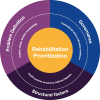Prioritizing rehabilitation in low- and middle-income country national health systems: a qualitative thematic synthesis and development of a policy framework
- PMID: 37198596
- PMCID: PMC10189207
- DOI: 10.1186/s12939-023-01896-5
Prioritizing rehabilitation in low- and middle-income country national health systems: a qualitative thematic synthesis and development of a policy framework
Abstract
Background: There is a large and growing unmet need for rehabilitation - a diverse category of services that aim to improve functioning across the life course - particularly in low- and middle-income countries. Yet despite urgent calls to increase political commitment, many low- and middle-income country governments have dedicated little attention to expanding rehabilitation services. Existing policy scholarship explains how and why health issues reach the policy agenda and offers applicable evidence to advance access to physical, medical, psychosocial, and other types of rehabilitation services. Drawing from this scholarship and empirical data on rehabilitation, this paper proposes a policy framework to understand national-level prioritization of rehabilitation in low- and middle-income countries.
Methods: We conducted key informant interviews with rehabilitation stakeholders in 47 countries, complemented by a purposeful review of peer-reviewed and gray literature to achieve thematic saturation. We analyzed the data abductively using a thematic synthesis methodology. Rehabilitation-specific findings were triangulated with policy theory and empirical case studies on the prioritization of other health issues to develop the framework.
Results: The novel policy framework includes three components which shape the prioritization of rehabilitation on low- and middle-income countries' national government's health agendas. First, rehabilitation lacks a consistent problem definition, undermining the development of consensus-driven solutions which could advance the issue on policy agendas. Second, governance arrangements are fragmented within and across government ministries, between the government and its citizens, and across national and transnational actors engaged in rehabilitation service provision. Third, national legacies - particularly from civil conflict - and weaknesses in the existing health system influences both rehabilitation needs and implementation feasibility.
Conclusions: This framework can support stakeholders in identifying the key components impeding prioritization for rehabilitation across different national contexts. This is a crucial step for ultimately better advancing the issue on national policy agendas and improving equity in access to rehabilitation services.
Keywords: Disability; Global health; Governance; Health policy; Health priorities; Low- and middle-income countries; Politics; Rehabilitation.
© 2023. The Author(s).
Conflict of interest statement
The authors declare no competing interests.
Figures
References
-
- Rehabilitation. World Health Organization. 2021. Cited 2022 Feb 17. Available from: https://www.who.int/news-room/fact-sheets/detail/rehabilitation.
-
- Declaration of Alma-Ata. International conference on primary health care, Alma-Ata, USSR, 6-12 September 1978. 1978. p. 1–3. - PubMed
-
- Article 26 – Habilitation and rehabilitation. United Nations. 2006. Cited 2022 Feb 18. Available from: https://www.un.org/development/desa/disabilities/convention-on-the-right....
Publication types
MeSH terms
LinkOut - more resources
Full Text Sources


